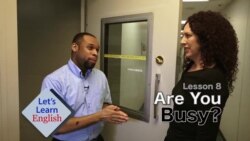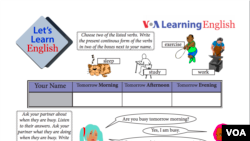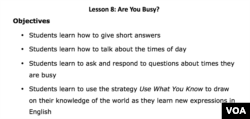Let's Learn English (Tiếng Anh cơ bản) là một khóa học tiếng Anh mới. Các giáo viên dạy tiếng Anh-Mỹ đã soạn thảo khóa học này cho những người mới bắt đầu. Khóa học sẽ kéo dài trong 52 tuần.
Mỗi tuần sẽ có một bài học mới bằng video cho thấy cuộc sống của giới trẻ Mỹ. Bài học giúp trau dồi kỹ năng nói, viết và từ vựng.
Ngoài ra cũng sẽ có các bài thực hành có thể in ra, bảng đánh giá và kế hoạch học tập cho cá nhân và giáo viên dạy tiếng Anh. Chúng tôi khuyến khích các bạn theo dõi các bài học hàng tuần và chia sẻ sự tiến bộ của bạn với chúng tôi qua phần ý kiến và email.
Tóm lược (Summary)
Anna wants to apologize to her co-workers. She learns what they do at the same time every day.
Anna muốn xin lỗi những đồng nghiệp của cô ấy. Cô ấy biết thêm về công việc mà họ làm hàng ngày.
Nói (Speaking)
In this video, learn to say the new words. Learn to talk about three times of the day. You can also download the Activity Sheet and practice with a friend.
Cách phát âm (Pronunciation)
In this video, you learn how Americans make hesitation noises, like um, to give themselves more time to think of an answer. You can also learn how to use emphasis when you apologize and accept an apology.
Phần đối thoại (Conversation)
Anna: Hello, everyone. Here I am at my new job! Yesterday at my first day of work … Well, let’s not talk about yesterday. Today is a new day! Today I want to apologize to my co-workers.
* Phew! is a sound used to show that you are relieved, tired, or hot
Viết (Writing)
What do you do every morning? You can see some examples in the Activity Sheet. Click on the image to download it. Write to us in the Comments section.
Sách lược học tập (Learning Strategy)
Learning Strategies are the thoughts and actions that help make learning easier or more effective. The learning strategy for this lesson is Use What You Know. We have knowledge about the world we use when learning a new language or a new skill. Here is an example.
In this lesson's video, Anna learns that her co-workers do things at the same time each day. She understands this idea because she also has to do work at the same time every day. She uses what she knows and remembers not to bother her co-workers at the times they are busy.
How do you use what you know in studying English? Write to us in the Comments section or send us an email. Teachers, see the Lesson Plan for more details on teaching this strategy.
Bài kiểm tra kỹ năng nghe (Listening Quiz)
Desktop Computer: Click here to go directly to the Listening Quiz. Click on the button below if you are on a mobile device or our mobile site.
Từ ngữ mới (New Words)
afternoon - n. the middle part of the day : the part of the day between noon and evening
apologize - v. to express regret for doing or saying something wrong : to give or make an apology
evening - n. the last part of the day and early part of the night
job - n. the work that a person does regularly in order to earn money
later - adj. happening near the end of a process, activity, series, life, etc.
light - n. a source of light (such as an electric lamp)
maybe - adv. possibly but not certainly
morning - n. the early part of the day : the time of day from sunrise until noon
now - adv. at the present time
studio - n. the building or room where an artist works
surprise - n. an unexpected event, piece of information, etc.
yesterday - n. the day before today
______________________________________________________________
Tài liệu miễn phí (Free Materials)
Download the VOA Learning English Word Book for a dictionary of the words we use on this website.
Each Let's Learn English lesson has an Activity Sheet for extra practice on your own or in the classroom. In this lesson, you can use it to practice a conversation about activities.
Phần dành cho giáo viên (For )Teachers
See the Lesson Plan for this lesson for ideas and more teaching resources. Send us an email if you have comments on this course or questions.
Grammar focus: BE - Short answers; simple present tense to describe routine activities
Topics: Times of day: morning, evening, afternoon
Speaking & Pronunciation Focus: Times of day; regular activities; hesitation noise "um;" apologizing with stress or intonation
______________________________________________________________
Now it's your turn. Send us an email or write to us in the Comments section below or on our Facebook page to let us know what you think of this lesson.















